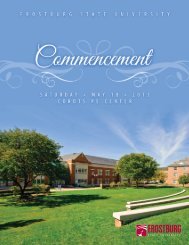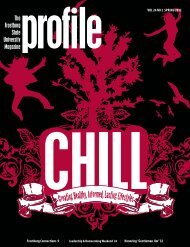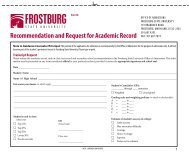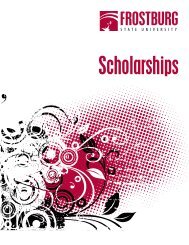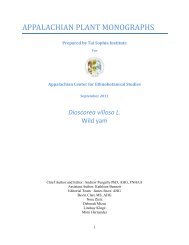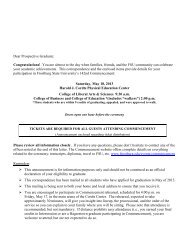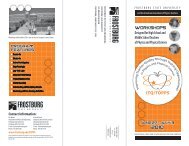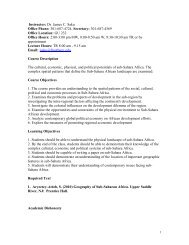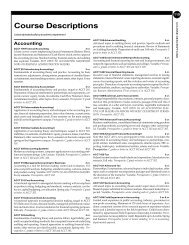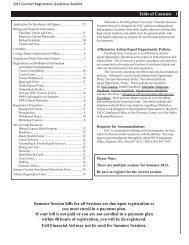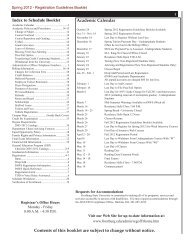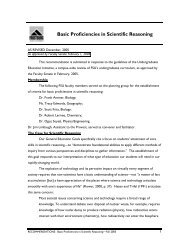Artful Aspirations, Cool Careers - Frostburg State University
Artful Aspirations, Cool Careers - Frostburg State University
Artful Aspirations, Cool Careers - Frostburg State University
You also want an ePaper? Increase the reach of your titles
YUMPU automatically turns print PDFs into web optimized ePapers that Google loves.
Council headquarters in Cumberland, Md., for a night of reading their<br />
own work and that of other poets, and connecting with other writers<br />
in the area. And LaFemina and other staff members are always participating<br />
in activities that bring young people to FSU to learn more<br />
about creative writing.<br />
“I love working with kids, so I think all the outreach activities<br />
that have brought high school students to campus have been particularly<br />
gratifying,” says LaFemina, noting that he’s taught summer<br />
programs like Maryland’s GEAR UP and Savage Mountain Summer<br />
Arts Academy workshops.<br />
With so many good programs in place and lots of publications<br />
where writers can find an outlet for their work, it makes sense that the<br />
Center has big plans for the future. LaFemina would love to relocate it<br />
from Tawes Hall to a building that provides “a better, more welcoming<br />
and bigger spot for the Center … maybe by sharing a space and staff<br />
with FSU’s Children’s Literature Centre.” He also dreams of offering<br />
a place where the <strong>University</strong> could house resident writers and offer<br />
more salon-type activities.<br />
No matter how the Center<br />
grows, it’s clear that the <strong>University</strong><br />
is finally embracing an area in<br />
which it truly excels.<br />
“Aside from the obvious benefits<br />
to the community and FSU<br />
students, I think the Center is<br />
important for highlighting an<br />
area of genuine <strong>University</strong> excel-<br />
lence, a field in which English at<br />
FSU really can have a national<br />
Gerry LaFemina<br />
presence,” Schlegel says. “The English Department is justly proud of<br />
its teaching, service and scholarship, but in creative writing it can claim<br />
something special and thus could recruit unusually talented students<br />
and truly achieve national prominence.”<br />
English Department Boasts Two Pushcart Prize Winners<br />
Ask Barbara Hurd and Gerry LaFemina about how to make it as professional writers,<br />
and they might tell you it’s the little things that add up to big success — and the<br />
small presses that offer some of the most exciting publishing opportunities. Both faculty<br />
in FSU’s Department of English are recipients of the Pushcart Prize, an American<br />
literary award that recognizes the best writing published by small presses.<br />
“To win one of the Pushcart Prizes is especially pleasing to me, not only because<br />
of the honor, but because the awards go to writers associated with those often-overlooked<br />
small presses of this country, where so much good literary work is happening,”<br />
Hurd said.<br />
Hurd won the prize twice in recent years for her creative nonfiction and poems that<br />
often explore the meaning of the natural world, and LaFemina won his very first prize<br />
ever in spring 2008.<br />
“It’s a great honor to win one of these things,” LaFemina said. “I’ve been nominated<br />
eight other times, so ninth time is a charm!”<br />
LaFemina was honored for his poem, “Returning Home in the MG Just Before<br />
Dawn,” a work that was published in the summer 2007 issue of The Chattahoochee<br />
Review, a nationally recognized literary magazine sponsored by Georgia Perimeter<br />
College.<br />
Both Hurd and LaFemina join some of America’s most notable authors in earning<br />
Pushcart Prizes; in the past the award has been given to literary greats such as John<br />
Irving, Raymond Carver and Andre Dubus.<br />
With Hurd, LaFemina and the other award-winning, published professors teaching<br />
in FSU’s Department of English, it seems likely that aspiring student writers will find<br />
their own successful storylines and continue FSU’s tradition of making waves in the<br />
literary world. —BR<br />
PROFILE<br />
Hurd Continues to Find Meaning<br />
in Places Most Overlook<br />
By Liz Douglas Medcalf<br />
Dr. Barbara Hurd has a way of looking at the mundane and seeing<br />
the universe.<br />
That ability is behind the FSU English professor’s first two critically<br />
acclaimed collections of environmental essays. In 2001, she<br />
slogged into swamps for Stirring<br />
the Mud: On Swamps, Bogs, and<br />
Human Imagination and descended<br />
into caves for Entering the Stone:<br />
On Caves and Feeling through the<br />
Dark in 2003.<br />
Now she has turned her attention<br />
to the waterfront and the debris on<br />
the shore after the tide goes out in<br />
Barbara Hurd<br />
Walking the Wrack Line: On Tidal<br />
Shifts and What Remains. The book<br />
was published in June by <strong>University</strong> of Georgia Press, which also reissued<br />
her two previous collections.<br />
This collection was harder than the other two, she says. Always<br />
one to explore new ways to write, Hurd started this book wanting to<br />
compose very short essays focusing on a single object, the “small little<br />
things broken underfoot.”<br />
“I even tried using no metaphor,” she laughs. “That didn’t last<br />
long,”<br />
What developed were individual essays that join an object washed up<br />
on a shore to themes as varied as turning points, habits and chance. A<br />
triangular piece of green sea glass leads to a mediation on transformation,<br />
not just how a jagged shard can become a smooth jewel, but how<br />
art and time transform people and places, even a beach that once was a<br />
garbage dump. An essay on a spider crab is not only informative about<br />
this creature’s unusual habit of camouflaging itself but also about the<br />
disguises we all resort to ourselves.<br />
The question Hurd asked herself as she studied each object – “What<br />
kind of coherence binds these?” – leads the reader down sometimes<br />
surprising and often illuminating paths, as she explores different ways<br />
of looking at the world.<br />
Already, the book has been hailed by National Public Radio’s Alan<br />
Cheuse as one of his “Summer Books to Feed Your Literary Addiction.”<br />
And while her publisher calls Wrack Line the final in a trilogy of<br />
“evocative nature writing,” Hurd says she’s not finished with her environmental<br />
essays. Nevertheless, she is exploring ways of expression<br />
beyond them as well.<br />
“I like to stretch myself. I just don’t always know what form that<br />
stretch is going to take,” she says.<br />
FSU Students’ “Green” Creativity Can be Viewed Online<br />
The first issue of the new student-written and student-edited magazine, E=(LG) 2 ,<br />
which focuses on environmental issues pertaining to <strong>Frostburg</strong> <strong>State</strong> <strong>University</strong>, was<br />
published this spring.<br />
A semester-long project for Dr. Sydney Duncan’s English 402 class, “Editing and<br />
Production,” the students created an environmentally friendly magazine, which had<br />
a limited run on recycled paper and is also available online at http://organizations.<br />
frostburg.edu/LgMag/LgMag1.pdf.<br />
The magazine will be published every semester. The articles and fiction focus on<br />
environmental or sustainability issues in FSU’s immediate area and concentrate on<br />
student research, class activities, nature appreciation, club activities and journalism.<br />
Barkley Writes Half a Story,<br />
Finds New Genre<br />
By Liz Douglas Medcalf<br />
What began as a playful e-mail exchange between two writers has turned<br />
into an interesting sideline for Brad Barkley.<br />
Barkley, an associate professor in the Department of English who has<br />
published two novels and two short story collections, says he was starting<br />
to burn out on short stories after writing about 100, and a third novel<br />
was lingering unfinished. He was looking for a change of pace.<br />
That change came almost accidentally. He and Heather Hepler, a<br />
friend and fellow writer who lives in Texas, started bouncing a story back<br />
and forth between them, each taking the point of view of an alternate<br />
character, playing a kind of “novel ping-pong,” he says.<br />
“Four or five chapters into it, we started to think, ‘This is kind of<br />
good,” he says<br />
That book, a young adult<br />
novel called Scrambled Eggs at<br />
Midnight, was finished in about<br />
nine weeks, he says, and was<br />
published by Dutton Children’s<br />
Books, a division of Penguin<br />
Group. “I think it went so fast<br />
because we weren’t taking it all<br />
that seriously.”<br />
“ I’m just<br />
interested in<br />
good stories.”<br />
—Brad Barkley<br />
And with Scrambled Eggs, Barkley<br />
had found two ways to revitalize<br />
his writing. He was exploring the<br />
young adult fiction genre that had<br />
been important to him as a youth,<br />
with books like A Separate Peace and<br />
Catcher in the Rye. And his craft,<br />
usually practiced alone, was being<br />
done in collaboration, with someone<br />
Brad Barkley else pushing the stories to places he<br />
might not have imagined.<br />
After Scrambled Eggs, published in 2006, the pair also wrote Dream<br />
Factory, published a year later, and Jars of Glass, which is due to come<br />
out this October.<br />
Quirky situations help move the stories along: Scrambled Eggs is<br />
about a teenage girl whose mother follows Renaissance Faires around<br />
the country who meets a teen boy whose father runs a Christian fat<br />
farm; Dream Factory tells the story of teenagers hired to play Cinderella<br />
and Dale the chipmunk at a Disney-like theme park when the regular<br />
character actors go on strike. In each, the characters move the story<br />
along in their alternating points of view – as do the authors in their<br />
separate voices.<br />
“The only rule we’ve had is we have full veto power over our own<br />
character. As my character appears in her chapters, I can say, ‘He<br />
wouldn’t do that,’” Barkley says.<br />
He and Hepler are collaborating on a fourth young adult book, but<br />
Barkley’s also back at work on Americaland, the novel he set aside for<br />
awhile.<br />
And while the young adult genre is interesting right now, he’ll let<br />
the ideas lead him where they want to go.<br />
“I’m just interested in good stories,” he says.<br />
u<br />
Books by Alumni<br />
Cricket by Robert W. Brannon ’62<br />
Nine-year-old Kristie “Cricket” Adams doesn’t believe<br />
the stereotype that girls are supposed to play house,<br />
wear pretty dresses and not get dirty. She’d rather play<br />
baseball. Cricket loves the game and plays in her town’s<br />
Minor Little League program. But she is disappointed<br />
when she isn’t chosen for an upper-level team, despite<br />
her talent and hard work. With tenacity and motivation,<br />
Cricket proves that dreams really do come true. Brannon<br />
wrote the book in memory of his daughter, the late<br />
Kristie Dawn Brannon, affectionately called “Cricket.”<br />
In a story in the Hagerstown Herald-Mail, he said the<br />
process of writing the book helped him achieve some<br />
closure following her death from cancer at age 16. “We felt closer to her by discussing and<br />
talking about the good times, the happy times,” Brannon told the newspaper. Cricket is<br />
published by iUniverse.<br />
Borrowed Soldiers by Mitchell A. Yockelson ’84<br />
Dr. Mitchell Yockelson examines the first time American<br />
and British forces fought together as a coalition force<br />
during Hundred Days Campaign of World War I, some<br />
two decades before D-Day. Yockelson, an instructor at<br />
the U.S. Naval Academy in Annapolis and an archivist<br />
at the National Archives, looks at how two forces of<br />
differing organization and attitude successfully merged<br />
their command relationships and operations. This was<br />
the partnership that broke the Hindenburg Line and<br />
helped convince the resistant American brass that winning<br />
modern wars requires a strong coalition. Borrowed<br />
Soldiers is published by <strong>University</strong> of Oklahoma Press.<br />
Into the Mirror Black and Angels of the Seventh Dawn<br />
by Frank E. Bittinger ’97<br />
Frank Bittinger has published the first two novels of<br />
his planned “hexology” of seven in the gothic horror<br />
tradition. In the first, Into the Mirror Black, Storm<br />
inherits a Victorian estate from his great-grandmother,<br />
but a mysterious book raises disturbing questions about<br />
his family’s past. In the second book, Angels of the<br />
Seventh Dawn, a novelist looking for inspiration instead<br />
discovers a world of vampires, werewolves and magic,<br />
and menacing events are set into motion. Part of the<br />
proceeds will help find homes for abused and neglected<br />
animals. Both are published by iUniverse.<br />
Growing up with B.G. by Don Hancock ’72<br />
Don Hancock humorously recounts his 1950s-1960s<br />
childhood in the Baltimore/Bel Air area, growing up<br />
as the older brother of the smarter “Boy Genius,” B.G.<br />
for short. These fictional tales of the brothers and their<br />
friends includes stories of visits to the Baltimore Zoo and<br />
an Orioles game and other youthful “misadventures.”<br />
Hancock mentions his alma mater in the chapter titled<br />
“Not a Creature was Stirring,” “where I majored in<br />
Psychology with a minor in Sledding on a Smuggled<br />
Cafeteria Tray.” Growing up with B.G. is published by<br />
Warwick House Publishing in Lynchburg, Va.<br />
12 fall2008 13




